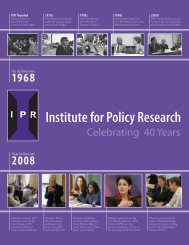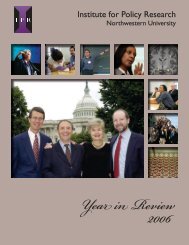Whatever Happened to the Emerging Democratic Majority?
Whatever Happened to the Emerging Democratic Majority?
Whatever Happened to the Emerging Democratic Majority?
Create successful ePaper yourself
Turn your PDF publications into a flip-book with our unique Google optimized e-Paper software.
J. Ziv<br />
11<br />
2004-05 IPR DISTINGUISHED PUBLIC POLICY LECTURE<br />
Education Key <strong>to</strong> Solving America’s “Real Jobs Problem”<br />
Globalization and technological change have widened <strong>the</strong><br />
gap between rich and poor in income, wealth, and economic<br />
opportunity “on every rung of <strong>the</strong> economic ladder,” according<br />
<strong>to</strong> former labor secretary Robert Reich, who delivered IPR’s<br />
2004-05 Distinguished Public Policy Lecture.<br />
Reich <strong>to</strong>ld an audience of 175 academics, students,<br />
and members of <strong>the</strong> public that<br />
“America’s Real Jobs Problem,”<br />
should not be viewed merely as<br />
a cyclical pattern of job losses<br />
and gains that can be fixed by<br />
stimulating <strong>the</strong> economy. The<br />
problem has been caused by “<strong>the</strong><br />
combined effects of globalization<br />
and technology, [which] have<br />
produced a labor force that is<br />
splitting between professionals<br />
and personal service workers,” he<br />
warned. “Professionals, overall, are<br />
doing well and will continue <strong>to</strong> do<br />
better. Personal service workers<br />
are doing worse and worse.”<br />
Reich views globalization as a<br />
double-edged sword, enhancing<br />
“<strong>the</strong> value of people who add<br />
great value <strong>to</strong> <strong>the</strong> global economy,” but undermining <strong>the</strong><br />
economic security and wages of less-educated workers whose<br />
relatively routine tasks can easily be done elsewhere.<br />
Over <strong>the</strong> past 25 years, technological change has exacerbated<br />
<strong>the</strong>se trends, forcing former working-class and lower middleclass<br />
workers in<strong>to</strong> <strong>the</strong> lower wage, personal-service sec<strong>to</strong>r<br />
where <strong>the</strong>re is less job security and fewer benefi ts. Jobs such<br />
as those in restaurants, hospitals, hotels, eldercare, childcare,<br />
and construction, for example, don’t compete globally and<br />
don’t compete with software, observed Reich.<br />
Reich acknowledged that jobs are slowly coming back. But<br />
<strong>the</strong> recovery is extremely slow, he said, because American<br />
consumers are saddled with huge personal debt while <strong>the</strong>y<br />
grapple with stagnant wages, soaring health care costs,<br />
and rising energy prices. All this has put <strong>the</strong> reins on <strong>the</strong>ir<br />
discretionary spending, which in turn discourages business<br />
from new investments in equipment, innovation, and production<br />
facilities.<br />
What can be done about <strong>the</strong> jobs problem? Though<br />
outsourcing is a favorite scapegoat among politicians, Reich<br />
downplayed its impact. There will always be a set of “innovative,<br />
creative, insightful” jobs that will be in greater and greater<br />
demand, he maintained. Wages and benefi ts for <strong>the</strong> collegeeducated,<br />
adjusted for inflation, “are on an upward escala<strong>to</strong>r—<br />
outsourcing or no outsourcing.”<br />
Reich also branded Bush’s 2001 tax cut that went largely<br />
<strong>to</strong> <strong>the</strong> wealthy as “a terrible mistake…a very ineffi cient way<br />
<strong>to</strong> stimulate <strong>the</strong> economy.” Disputing <strong>the</strong> president’s premise<br />
that <strong>the</strong> rich will spend more, he argued that “wealthy people<br />
already spend as much as <strong>the</strong>y want <strong>to</strong> spend.”<br />
It would be far more effi cient, he said, <strong>to</strong> put money directly<br />
in<strong>to</strong> <strong>the</strong> pockets of people who are more likely <strong>to</strong> spend it.<br />
This might be accomplished, for example, by exempting <strong>the</strong><br />
fi rst $20,000 of income from <strong>the</strong> payroll tax for a year or two<br />
or raising <strong>the</strong> $88,000 ceiling<br />
on <strong>the</strong> portion of <strong>the</strong> payroll<br />
tax going <strong>to</strong> Social Security.<br />
But <strong>the</strong> best long-term<br />
answer <strong>to</strong> <strong>the</strong> real jobs problem<br />
is investing in education,<br />
especially K through 12 and<br />
early childhood education,<br />
and providing better access<br />
<strong>to</strong> postsecondary training,<br />
Reich <strong>to</strong>ld his audience. Even<br />
a year’s technical training after<br />
high school could open more<br />
lucrative jobs <strong>to</strong> low-wage<br />
workers, especially as lab,<br />
offi ce, or hospital technicians,<br />
he said. “There is a tremendous<br />
demand for people who can<br />
install, improve upon, and<br />
maintain all sorts of machinery. Those jobs would pay a lot<br />
and could create a new middle class. But we are not training<br />
people for <strong>the</strong>se jobs.”<br />
Reich found that Republicans are successfully tapping in<strong>to</strong><br />
what he termed “cultural populism,” appealing <strong>to</strong> workers who<br />
are targeting anger about <strong>the</strong>ir declining economic status <strong>to</strong><br />
liberal East and West Coast elites. “They perceive <strong>the</strong>se groups<br />
as culturally so different and so far removed from working<br />
people that <strong>the</strong>y seem not <strong>to</strong> care about <strong>the</strong> working people<br />
of this country,” Reich observed. “It is a very potent, powerful<br />
political <strong>to</strong>ol.”<br />
Reich, who served as President Clin<strong>to</strong>n’s Secretary of Labor<br />
from 1993 <strong>to</strong> 1997, said <strong>the</strong> Democrats must do a better job of<br />
responding <strong>to</strong> <strong>the</strong> crisis of America’s working class, especially<br />
in <strong>the</strong> heartland. He also advocated expanding <strong>the</strong> Earned<br />
Income Tax Credit and rolling back tax cuts for those earning<br />
more than $200,000. These funds could be used <strong>to</strong> provide<br />
affordable health care and serve as a down payment on <strong>the</strong><br />
budget defi cit, he said.<br />
Robert Reich<br />
Robert Reich is University Professor and Maurice B. Hexter Professor<br />
of Social and Economic Policy at Brandeis University. He has written<br />
10 books, including The Work of Nations, The Future of Success,<br />
Locked in <strong>the</strong> Cabinet, and most recently, Reason. He is co-founder<br />
and national edi<strong>to</strong>r of The American Prospect.<br />
To hear <strong>the</strong> audio recording or download <strong>the</strong> complete<br />
lecture, please go <strong>to</strong>: www.northwestern.edu/ipr/events/<br />
lectures/dpplectures.html
















